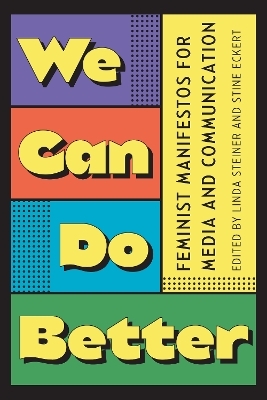
We Can Do Better
Rutgers University Press (Verlag)
978-1-9788-3817-8 (ISBN)
- Noch nicht erschienen (ca. April 2025)
- Versandkostenfrei innerhalb Deutschlands
- Auch auf Rechnung
- Verfügbarkeit in der Filiale vor Ort prüfen
- Artikel merken
Linda Steiner is a professor and Associate Dean for Faculty Affairs in the College of Journalism at the University of Maryland; she previously directed the UMD’s ADVANCE program, which promotes the interests of women and faculty of color. She is an ICA Fellow. She served 8 years as editor of Journalism & Communication Monographs, and has published nine co-authored or co-edited books. Her co-authored books include Women and Journalism and her co-edited books include Newswork and Precarity; Front Pages, Front Lines: Media and the Fight for Women's Suffrage; and Journalism, Gender, and Power. Stine Eckert is an associate professor in the Department of Communication at Wayne State University, where she is also co-PI of the NSF ADVANCE grant project to promote better gender equity policy in STEM fields. She serves on the board of WSU’s Gender, Sexuality and Women’s Studies program. She chairs the Feminist Scholarship Division of the International Communication Association division’s award for emerging feminist scholarship. She is editor of the bi-lingual journal Journalism Research / Journalistik. She is co-editor of Reflections on Feminist Communication and Media Scholarship: Theory, Method, Impact.
Introduction: The herstory of the (feminist) manifesto, Stine Eckert and Linda Steiner
Part I: What the F—k: Demands for Better Media Practices
Chapter 1: A Feminist Media Manifesta, Frieda Werden
Chapter 2: How to Fight for Representational Change, Lori Kido Lopez
Chapter 3: Power, passion, and politics: Vulnerability and feminist ethics in journalism, Meenakshi Gigi Durham
Chapter 4: Women Are Not War or Weather: A Short History of Journalism’s Relationship with Feminism and Why It Needs to Change, Carolyn Kitch
Chapter 5: We Know This Story Too Well: Black Women Struggles in Newsrooms and Journalism Classrooms, Denetra Walker and Erin L. Perry
Chapter 6: More Than Pink Pussyhats: For Better Protest Coverage, Summer Harlow
Chapter 7: For Gender-Sensitive Journalism: Stop Stereotyping, Diminishing, and Marginalizing Women, Dustin Harp
Chapter 8: Still on the Sidelines: Women’s Sports, Women Athletes, and Women Sports Journalists Deserve Better, Carolina Velloso
Chapter 9: We Need Gender Equality in Children’s Media, Dafna Lemish
Part II: This Was Supposed to be a Better Place -- Demands for Online Spaces
Chapter 10: Imagining a Better Internet Through a Feminist Lens, Gina M. Masullo
Chapter 11: Online and Unguarded: Newsrooms Must Be Radical About Protecting Black Women Journalists, Erin L. Perry and Denetra Walker
Chapter 12: When White Feminists Become Mean Girls: Calling White Feminists In to Stop Gaslighting, Gatekeeping, and Girlbossing, Kim Hong Nguyen and Katy Fulfer
Chapter 13: The Complexities of “Cancel Culture,” Its Practices and Politics, Eve Ng
Chapter 14: The Internet Is (and Remains) for P0rn, Jade Metzger-Riftkin and Amara B. Sugalski
Chapter 15: Can You See Me Beyond, NOT Behind, My Hijab? Resisting Muslim Women’s (Mis)Representation and (Under)Representation in Western Media, Sahar Khamis
Part II: Precision, Precision – Demands for Language
Chapter 16: Repeat After Us: Gender Is About Culture; Sex About Biology, Linda Steiner and Stine Eckert
Chapter 17: Let Me Blow Your Mind: “Biological Sex” Is a Made-Up Category That Belies the Complexity of Nature, Miglena Sternadori
| Erscheint lt. Verlag | 15.4.2025 |
|---|---|
| Co-Autor | Linda Steiner, Stine Eckert, Frieda Werden |
| Zusatzinfo | 3 B-W images |
| Verlagsort | New Brunswick NJ |
| Sprache | englisch |
| Maße | 152 x 229 mm |
| Gewicht | 454 g |
| Themenwelt | Sozialwissenschaften ► Kommunikation / Medien ► Kommunikationswissenschaft |
| Sozialwissenschaften ► Kommunikation / Medien ► Medienwissenschaft | |
| Sozialwissenschaften ► Politik / Verwaltung ► Politische Theorie | |
| Sozialwissenschaften ► Soziologie | |
| ISBN-10 | 1-9788-3817-4 / 1978838174 |
| ISBN-13 | 978-1-9788-3817-8 / 9781978838178 |
| Zustand | Neuware |
| Informationen gemäß Produktsicherheitsverordnung (GPSR) | |
| Haben Sie eine Frage zum Produkt? |
aus dem Bereich


